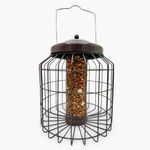Buying Guide for the Best Squirrel Proof Feeders
Choosing the right squirrel-proof feeder can be a game-changer for bird enthusiasts. Squirrels are notorious for raiding bird feeders, often scaring away the birds and consuming all the food. A good squirrel-proof feeder will ensure that your feathered friends get their fair share of the food while keeping the pesky squirrels at bay. When selecting a squirrel-proof feeder, there are several key specifications to consider to ensure you get the best fit for your needs.Design and MechanismThe design and mechanism of a squirrel-proof feeder are crucial as they determine how effectively the feeder can deter squirrels. Some feeders use weight-activated mechanisms that close off access to the food when a squirrel's weight is detected, while others have cages or baffles that physically block squirrels. If you have a lot of squirrels in your area, a weight-activated feeder might be more effective. For areas with fewer squirrels, a simple caged feeder could suffice. Consider the persistence and number of squirrels in your area when choosing the design.
Material and DurabilityThe material and durability of the feeder are important because squirrels can be quite destructive. Look for feeders made from sturdy materials like metal or heavy-duty plastic that can withstand chewing and weather conditions. Metal feeders are generally more durable and can last longer, but they might be heavier and more expensive. Plastic feeders are lighter and often cheaper, but they may not hold up as well against determined squirrels. If you live in an area with harsh weather or very persistent squirrels, investing in a more durable feeder is wise.
CapacityThe capacity of the feeder refers to how much bird food it can hold. This is important because a larger capacity means you won't have to refill the feeder as often. If you have a lot of birds visiting your feeder, or if you prefer not to refill it frequently, choose a feeder with a larger capacity. However, larger feeders can also be heavier and more difficult to handle. If you have fewer birds or don't mind frequent refills, a smaller capacity feeder might be more suitable.
Ease of CleaningEase of cleaning is an important factor because bird feeders need to be cleaned regularly to prevent mold and disease. Look for feeders that can be easily disassembled and have smooth surfaces that are easy to wipe down. Feeders with fewer nooks and crannies are generally easier to clean. If you have limited time for maintenance, choose a feeder that is specifically designed for easy cleaning. This will help ensure the health and safety of the birds visiting your feeder.
Mounting OptionsMounting options refer to how and where you can place your feeder. Some feeders are designed to be hung from a tree or pole, while others can be mounted on a post. Consider where you plan to place your feeder and choose one that offers the appropriate mounting option. Hanging feeders are often more versatile and can be moved around easily, while post-mounted feeders can be more stable and secure. Think about the layout of your yard and where you get the most bird activity when deciding on the mounting option.

















